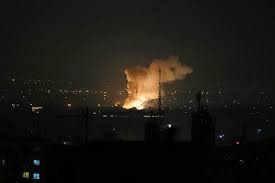
Reuters – Israel launched widescale strikes against Iran on Friday, saying it targeted nuclear facilities, ballistic missile factories and military commanders and that this was the start of a prolonged operation to prevent Tehran from building an atomic weapon.
Iran had launched about 100 drones towards Israeli territory in retaliation, which Israel is working to intercept, Israeli military spokesman Brigadier General Effie Defrin said.
Iranian media and witnesses reported explosions including at the country’s main uranium enrichment facility at Natanz, while Israel declared a state of emergency in anticipation of retaliatory missile and drone strikes.
Iran’s elite Revolutionary Guards corps said its top commander, Hossein Salami, was killed and state media reported the unit’s headquarters in Tehran had been hit. Several children had been killed in a strike on a residential area in the capital, it said.
“We are at a decisive moment in Israel’s history,” Israeli Prime Minister Benjamin Netanyahu said in a recorded video message.
“Moments ago Israel launched Operation Rising Lion, a targeted military operation to roll back the Iranian threat to Israel’s very survival. This operation will continue for as many days as it takes to remove this threat.”
Defrin said 200 Israeli fighter jets took part in the strikes, hitting more than 100 targets in Iran.
Israel could now confirm that the chief of staff of the Iranian Armed Forces, the commander of the Revolutionary Guards and the commander of Iran’s Emergency Command were all killed in the strikes across Iran, he told an online briefing.
Iran’s Supreme Leader Ayatollah Ali Khamenei said in a statement that Israel had “unleashed its wicked and bloody” hand in a crime against Iran and that it would receive “a bitter fate for itself”.
Airlines cleared out of the airspace over Israel, Iran and Iraq and Jordan on Friday after the Israelis strikes, Flightradar24 data showed, with carriers scrambling to divert and cancel flights to keep passengers and crew safe.
An Israeli military official said Israel was striking “dozens” of nuclear and military targets including the facility at Natanz in central Iran. The official said Iran had enough material to make 15 nuclear bombs within days.
The United States said it had no part in the operation, which raises the risk of a fresh escalation in tensions in the Middle East, a major oil producing region.
Alongside extensive air strikes, Israel’s Mossad spy agency led a series of covert sabotage operations inside Iran, Axios reported, citing a senior Israeli official. These operations were aimed at damaging Iran’s strategic missile sites and its air defence capabilities.
Iranian state media reported that at least two nuclear scientists, Fereydoun Abbasi and Mohammad Mehdi Tehranchi were killed in Israeli strikes in Tehran.
The National Iranian Oil Refining and Distribution Company said the country’s oil refining and storage facilities did not sustain damages and their activities were ongoing.
Iran closed its airspace and Tel Aviv’s Ben Gurion Airport was closed until further notice.
Israeli military Chief of Staff Eyal Zamir said tens of thousands of soldiers had been called up and “prepared across all borders”.
“We are amidst a historic campaign unlike any other. This is a critical operation to prevent an existential threat, by an enemy who is intent on destroying us,” he said.
Israeli Foreign Minister Gideon Saar was holding a “marathon of calls” with counterparts around the world regarding Israel’s attack on Iran, the foreign ministry said in a statement.
TALKS WITH IRAN
U.S. President Donald Trump said that Iran cannot have a nuclear bomb and that the United States was hoping to get back to the negotiating table, in an interview with Fox News after the start of the Israeli air strikes on Iran.
“We will see,” Fox News reporter Jennifer Griffin quoted Trump as saying in a post on X.
U.S. officials have repeatedly said that any new nuclear deal with Iran – to replace a failed 2015 accord between Tehran and six world powers – must include a commitment to scrap enrichment, viewed as a potential pathway to developing nuclear bombs.
The Islamic Republic has repeatedly denied such intentions, saying it wants nuclear energy only for civilian purposes, and has publicly rejected Washington’s demand to scrap enrichment as an attack on its national sovereignty.
Iran’s government said in a statement that Israel’s “cowardly” attack shows why Tehran insists on enrichment, nuclear technology and missile power.
Trump would convene a meeting of the National Security Council on Friday morning, the White House said. He had said on Thursday an Israeli strike on Iran “could very well happen” but reiterated his hopes for a peaceful resolution.
The U.S. military is planning for the full range of contingencies in the Middle East, including the possibility that it might have to help evacuate American civilians, a U.S. official told Reuters.
Iran’s armed forces spokesperson said Israel and its chief ally the United States would pay a “heavy price” for the attack, accusing Washington of providing support for the operation.
While the U.S. tried to distance itself from Israel’s military operation, an Israeli official told public broadcaster Kan that Israel had coordinated with Washington on Iran.
U.S. Secretary of State Marco Rubio said the United States was not involved in the strikes and Tel Aviv had acted unilaterally for self-defence.
“Let me be clear: Iran should not target U.S. interests or personnel,” he said.
The attacks triggered sharp falls in stock prices in Asian trade on Friday, led by a selloff in U.S. futures, while oil prices jumped as investors scurried to safe havens such as gold and the Swiss franc.
U.N. Secretary-General Antonio Guterres condemned any military escalation in the Middle East, said deputy U.N. spokesperson Farhan Haq.
“The Secretary-General asks both sides to show maximum restraint, avoiding at all costs a descent into deeper conflict, a situation that the region can hardly afford,” Haq said.
NUCLEAR TALKS
U.S. and Iranian officials were scheduled to hold a sixth round of talks on Tehran’s escalating uranium enrichment programme in Oman on Sunday, according to officials from both countries and their Omani mediators.
A U.S. official said those talks were still scheduled to proceed despite the Israeli attack.
The Israeli military said on Friday that it was forced to act based on new intelligence information showing that Iran was “approaching the point of no return” in the development of a nuclear weapon.
A source familiar with U.S. intelligence reports said there had been no recent change in the U.S. intelligence assessment that Iran was not building a nuclear weapon and that Khamenei had not authorised the restarting of the nuclear weapons programme that was shuttered in 2003.

